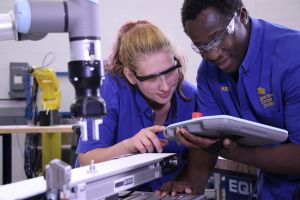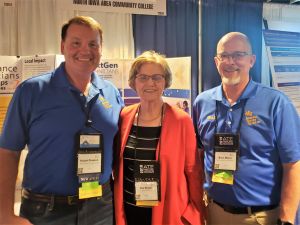

When the first collaborative robot or cobot arrived at Northern Iowa Area Community College (NIACC), the NextGen Technician project team members named it “Osa” in honor of their Mentor-Connect mentor Osa Brand.
“She’s just a really good educator,” Robert Franken said of Brand. Franken is the industrial systems technology instructor and principal investigator of the NextGen Technicians: Addressing Industry Demand for Robotics project that began in June 2019 when NIACC received its first Advanced Technological Education grant (Award 1901957) from the National Science Foundation (NSF).
Although Brand's academic expertise is geography and not manufacturing, Franken said her thorough knowledge of grant preparation helped him, Brian Mason, electronics tech instructor, Jana Grzenda, grant writer, and Laura Wood, Business division chair, work out their ideas for adding robotics to the industrial systems technology and industrial mechanics and maintenance programs.
He recalled in particular how Brand would listen for long stretches during their in-person sessions at two Mentor-Connect workshops and then say things like, “that’s fine, but remember this,” and then offer a helpful suggestion. “She has so much experience with NSF, so she knows a lot of the things that when we’re going for our grant she just knows how to narrow down things, and simplify things, and reword things that are better,” he said.
This sort of targeted advice is typical of the mentoring that 10 Mentor-Connect mentors provide in person, during phone conference calls, and via email during the nine months that community college teams selected for Mentor-Connect work on their ATE proposals.
In response to emailed questions, Brand wrote, “It was certainly fun to hear about the Osa robot.” She noted it was just one example of how much mentees value Mentor-Connect’s assistance.
She also explained that while it is not always possible to match academic areas with proposals being developed, it has not been an issue. “If we need expert input we can call on other mentors who are more knowledgeable in a given field. But we all assume that the proposed PIs [principal investigators] and co-PIs [co-principal investigators] have the necessary technical expertise.
“Our main task is to help them shape and explain their projects in the context of NSF funding requirements … We work with them to address questions such as: Will the project meet important workforce needs within the college service area? Are the goals and objectives realistic in scope? Is the budget appropriate for the scope of the project? Are the activities well-aligned with the objectives? Will the project have strong industry support? Will it be sustainable once the funding ends?”
Faculty from two-year colleges that have not had ATE grants in the past seven years are eligible for Mentor-Connect. The application for the 2021 Mentor-Connect cohort will be available in July 2020.
In addition to the immediate goal of helping college teams prepare competitive proposals, Mentor-Connect offers programming and technical resources to cultivate STEM leaders at community colleges. Mentor-Connect, itself an ATE-funded project, is led by the South Carolina Advanced Technological Education Center of Excellence (SCATE): National Resource Center at Florence-Darlington Technical College in Florence, SC, in partnership with the American Association of Community Colleges in Washington, DC.
Cobot-induced Excitement
The four cobots the college is purchasing with a portion of its $299,962 ATE grant provide a platform for the new Introduction to Robotics course as well as community outreach about robotics and STEM careers. Cobots, which are small robots designed to operate safely in close proximity to humans, “are really taking the world by storm,” Franken said.
Only a few days after the first cobot arrived on campus, the team had it configured it to dispense pencils at a STEM program for children. Co-principal investigator Brian Mason worked with students on an auto cad design to create a box for the cobot to use to dispense pencils. Meanwhile students in Franken’s advanced automation course mounted a conveyor belt with an infrared sensor to track the pencils as they moved down the belt. Special grippers were created to pick up the pencils.
Many of the youngsters who received one of the 500 pencils distributed at the event also wanted “to pet” the cobot, which had a sign introducing it as Osa. “It was kind of cute,” Franken said.
The grant also supports professional development for Mason and Franken. In the summer they attended programs to ensure that the new curricula they are creating help students qualify for industry-recognized credentials from the National Coalition of Certification Centers (NC3).
“Our program is really a MacGyver-of-all-trades, an industrial maintenance technician,” Franken said referring to the troubleshooting, engineering genius who was the subject of a 1980s television show.
To prepare versatile technicians the college’s programs have long covered fluid power, pneumatics, hydraulics, mechanical maintenance, and coding. But until the college received the ATE grant, only students who opted to focus on robotics for their capstone projects got beyond the basics of the technology that industry increasingly uses for materials handling, inspection, and packaging.
“We knew we needed it, and now we can offer it to all our students rather than just one or two every year. We just know that this robotics add is going to be great for the college,” he said.

 Subscribe
Subscribe


 See More ATE Impacts
See More ATE Impacts

Comments
There are no comments yet for this entry. Please Log In to post one.